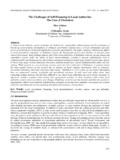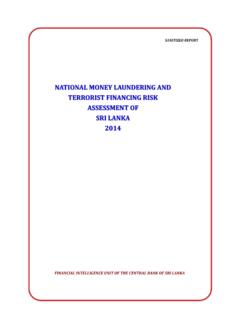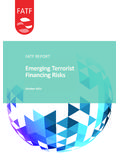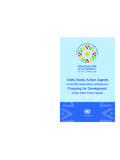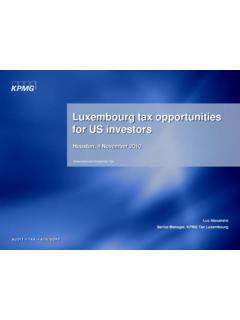Transcription of PRIVATE FINANCE FOR SUSTAINABLE DEVELOPMENT
1 Monday, 29 January 2018 OECD Paris Boulogne Auditorium Join the conversation on #PF4 SDG @OECDdev The inaugural OECD Conference on PRIVATE FINANCE for SUSTAINABLE DEVELOPMENT brought together - for the first time in a single forum - the main actors from policy and practice on Blended FINANCE , Social Impact Investing and Green FINANCE to answer the question: "Milestone 2020: How can we make sure PRIVATE mobilisation leads to greater transformative impact?" Over 250 participants attended the conference, representing policy makers from OECD members and developing countries, international organisations, DEVELOPMENT FINANCE practitioners, PRIVATE investors, civil society organisations and the press. The discussion was enriched by the launch of the new OECD report Making Blended FINANCE work for the SUSTAINABLE DEVELOPMENT Goals.
2 Introduction by the OECD The OECD has been playing an active role in supporting better policies for inclusive and SUSTAINABLE DEVELOPMENT FINANCE . Our mission is to develop policy guidance to help maximise the impact of these investments. A diverse set of stakeholder has convened to examine how PRIVATE financing models can bring additional commercial capital, but also deliver better results for the 2030 Agenda. The Conference kicks off a new era of joint strategic work that will transform how DEVELOPMENT FINANCE touches lives. Welcome by Jorge Moreira da Silva, Director, OECD DEVELOPMENT Co-operation Directorate Plenary address by Gabriela Ramos, OECD Chief of Staff and Sherpa to the G20 PRIVATE FINANCE FOR SUSTAINABLE DEVELOPMENT New approaches in DEVELOPMENT FINANCE : the need for mobilisation towards greater transformation and impact OECD DEVELOPMENT CO-OPERATION DIRECTORATE | PRIVATE FINANCE FOR SUSTAINABLE DEVELOPMENT | 2 What innovative financing partnerships are needed to achieve more mobilisation, transformation and impact in developing countries?
3 During the first panel discussion, key practitioners from the Blended FINANCE , Social Impact Investing and Green FINANCE scene agreed that more financing partnerships are needed to fill the SDG investment gap. More equity investment is needed in Africa to promote formal business and job creation, particularly through entrepreneurship. Because of its potential, collaboration between PRIVATE investors and DEVELOPMENT FINANCE institutions (DFIs) is the key to success. Another challenge is the lack of risk mitigation tools. Creating projects and capital on the ground is very difficult due to diverse and higher risk. In order to attract more PRIVATE investors, DFIs should focus more on their risk mitigation mandate. Governments, investment funds, and PRIVATE citizens abide to different rules, which may at times result in conflicting interests.
4 Partnerships are hampered by the lack of institutional incentives to collaborate. The attribution problem leads each investor to claim individual DEVELOPMENT outcomes and may thus deter them from working together. More research and agreement is needed on what additionality is and how it should be measured. Scene Setting Panel Moderator: Amar Bhattacharya, Senior Fellow, Brookings Institution Panellists: Jean-Michel Severino, Chief Executive Officer, Investisseurs & Partenaires Nancy Lee, Visiting Fellow, Centre for Global DEVELOPMENT Thierry D au, Founder and Chief Executive Officer, Meridiam OECD DEVELOPMENT CO-OPERATION DIRECTORATE | PRIVATE FINANCE FOR SUSTAINABLE DEVELOPMENT | 3 What more and what else can we do to steer PRIVATE FINANCE towards inclusive and SUSTAINABLE international DEVELOPMENT ? Policy makers and DEVELOPMENT FINANCE providers, from donor and developing country perspectives, tried to answer this question during the second plenary debate.
5 Since the adoption of the Addis Ababa Action Agenda, there has been greater emphasis on the PRIVATE sector. DFIs have never played a more prominent role, but they are faced with growing pressure to reinvent their strategy. They are still conservative in their risk appetite: too little investment goes to early stage infrastructure projects and SMEs. Also, their action should target more local capital markets, to build self- SUSTAINABLE financial ecosystems. Engaging business was part of the SDGs vision since the start. The alignment of interests can be facilitated by the creation of joint platforms, where all partners commit to pursue the SDGs, both domestically and abroad. Connecting domestic savings and growing demand from emerging market is a win-win solution.
6 To this end, DEVELOPMENT banks must actively engage to lower real and perceived risks. There is a positive conjuncture as citizens, and retirees, are becoming more sensitive about the environmental and social impact of their savings. As new tools become available to donors, and DEVELOPMENT banks are willing to share risk with the PRIVATE sector, more local intermediaries are needed in developing countries to facilitate investment. Emerging countries are also increasingly adopting innovative and inclusive strategies to develop their infrastructure. Due to the scarcity of public resources, the PRIVATE sector stands out as an indispensable partner to sustain a country s DEVELOPMENT . State of Play: Principles & Policies Moderator: Haje Sch tte, Head of Division, Financing for SUSTAINABLE DEVELOPMENT , OECD Discussants.
7 Cameron Khosrowshahi, Chief Investment Officer of PRIVATE Capital & Microenterprise Office at the Agency for International DEVELOPMENT Colin Buckley, Chief Operating Officer, CDC Group Kajsa Olofsg rd, Ambassador for the Post-2015 DEVELOPMENT Agenda, Sweden Wimboh Santoso, Chairman, Indonesia Financial Services Authority OECD DEVELOPMENT CO-OPERATION DIRECTORATE | PRIVATE FINANCE FOR SUSTAINABLE DEVELOPMENT | 4 Takeaways on cross cutting priorities By addressing the cross cutting objectives of mobilisation, transformation and impact, Blended FINANCE , Social Impact Investing and Green FINANCE practitioners were invited to reflect upon their use of the three different financing approaches. MOBILISATION Moderator: Paul Horrocks, OECD Discussants: Aron Betru, Managing Director, Center for Financial Markets, Milken Institute Kruskaia Sierra-Escalante, Manager of the Blended FINANCE Unit, IFC Ibrahima Kane, Chief Executive Officer, FONSIS Lasitha Perera, Chief Executive Officer, GuarantCo Rodrigo Salvado, Deputy Director, DEVELOPMENT Policy and FINANCE , Bill & Melinda Gates Foundation What financing structures are well adapted to mobilise PRIVATE and commercial capital for SUSTAINABLE international DEVELOPMENT ?
8 FINANCE is not the end goal: we are here to solve a problem, and we need to take a landscape view of the SDGs, looking at the interactions and cross-cutting themes. The main challenge is to translate DEVELOPMENT needs into SUSTAINABLE investment opportunities, and to channel FINANCE at reduced costs, through a well-managed risk-return balance. We must allow leverage ratios to grow over time but they should not become an objective per se. Regulatory frameworks need to be more flexible to boost blended FINANCE . The OECD DAC accounting rules should be reformed so that donors can get more credit for the guarantees they provide. The invisible hand of capacity building is crucial to enable and sustain the impact of PRIVATE FINANCE for SUSTAINABLE DEVELOPMENT . OECD DEVELOPMENT CO-OPERATION DIRECTORATE | PRIVATE FINANCE FOR SUSTAINABLE DEVELOPMENT | 5 TRANSFORMATION Moderator: Jens Sedemund, OECD Discussants: Alexandra Sombsthay, Diplomatic advisor, Solar Impulse Amal-lee Amin, Chief of the Climate Change Division, Inter-American DEVELOPMENT Bank Olav Kj rven, Chief Strategic Officer, EAT Foundation Pasi Hellman, Managing Director, Nordic DEVELOPMENT Fund How can donors and DEVELOPMENT FINANCE providers better connect investment demand and supply to enable transformative impact in green investment?
9 Green FINANCE needs to be SUSTAINABLE FINANCE , widening its focus beyond climate to encompass a broader range of issues. Infrastructure is a key to this and to achieving the transformation. There is still a mismatch between the way FINANCE is supplied and the needs on the demand side. Tailored instruments need to be combined with investments in the enabling environment to enable SUSTAINABLE transformative change. Considerable FINANCE and DEVELOPMENT assistance is still going to fossil energy where renewable energy alternatives are fully viable and competitive. How can PRIVATE and commercial capital best be leveraged for the achievement of social, economic and environmental impacts in developing countries? All investments, including DEVELOPMENT FINANCE , should have a clearly defined theory of change, which in turn sets up the criteria and metrics to measure their impact.
10 Impact measurement approaches should distinguish between direct impact and systems change. Public authorities should improve dialogue with the PRIVATE sector. Donors should consult more broadly and bring new actors to the table, including the banking sector. Impact evaluation and measurement must balance between the need for more accountability and learning versus what projects and people on the ground can effectively afford to report back. All actors are calling for more and better data to increase transparency but the question which lies unanswered is who is willing to invest the resources, both time and funding. IMPACT Moderator: Karen Wilson, OECD Discussants: Alice Chapple, Head of DEVELOPMENT Impact, PRIVATE Infrastructure DEVELOPMENT Group Gerbrand Haverkamp, Executive Director, Index Initiative Lars Christian Oxe, Senior Advisor, DANIDA Mara Bolis, Senior Advisor on Market Systems, Oxfam America Royston Braganza, Chief Executive Officer, Grameen Capital OECD DEVELOPMENT CO-OPERATION DIRECTORATE | PRIVATE FINANCE FOR SUSTAINABLE DEVELOPMENT | 6 What urgent actions must be implemented by 2020?










